 Photo credits: File photo @Obergurgl
Photo credits: File photo @Obergurgl
INTERVIEW: Janaki Devi´s scientific journey from India to Slovakia and Austria!
Janaki Devi Somasundaram - Glimpses of one’s Research Travelogue
Article originally published at OeAD website.
To find out more about the scholarship that Janaki Devi used to fund her stay in Austria, click on OeAD & SAIA - AKTION Austria-Slovakia Scholarship programme website.
Now, sit back and enjoy the story of Janaki Devi Somasundaram with a cup of coffee or tea in your hands...
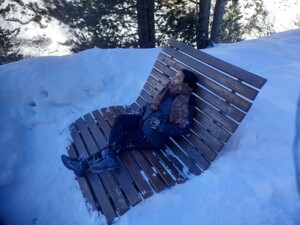 ‘Experience is something you always think you have, until you get more of it’ - a popular quote by Bill Vaughan. Before I dive deep into my story of how I was also thinking the same about my experience, I would like to introduce myself in a jiffy. I am Janaki Devi Somasundaram, natively from India, but a third-year PhD student at the Department of Inorganic Chemistry, from Comenius University in Bratislava, Slovakia, working under the supervision of Assoc. Prof. Dr. Lukas Krivosudsky.
‘Experience is something you always think you have, until you get more of it’ - a popular quote by Bill Vaughan. Before I dive deep into my story of how I was also thinking the same about my experience, I would like to introduce myself in a jiffy. I am Janaki Devi Somasundaram, natively from India, but a third-year PhD student at the Department of Inorganic Chemistry, from Comenius University in Bratislava, Slovakia, working under the supervision of Assoc. Prof. Dr. Lukas Krivosudsky.
Note to Readers: The writer of this article, requests the readers (may be prospective upcoming OeAD scholarship holders!) to sit back on a reclining chair, with a mug of coffee to devour this scientific journey with peace, sprinkled with some personalized life lessons.
I happened to pursue a 6-month research stay at the University of Innsbruck, under the scheme of AKTION Austria-Slovakia research grant for doctoral students and the purpose of this article is to shed light on the roadmap I traveled during this research stay journey, and subsequently to summarize the learning outcomes on career & personal fronts. The background information is that my original PhD thesis topic is focused on the bioinorganic chemical field and is specifically about the interaction of vanadium-based polyoxometalates with biological systems.
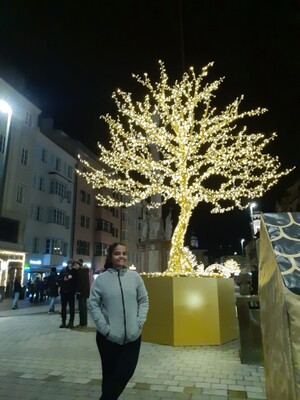 Since the time I began my doctoral studies in September 2020, I had some curiosity creeping into my mind about pursuing an internship abroad, mainly to extend my horizons in terms of scientific exposure. During the third year of my PhD research in 2022, I happened to stumble upon the AKTION Austria-Slovakia research grant for doctoral students through my university information cell.
Since the time I began my doctoral studies in September 2020, I had some curiosity creeping into my mind about pursuing an internship abroad, mainly to extend my horizons in terms of scientific exposure. During the third year of my PhD research in 2022, I happened to stumble upon the AKTION Austria-Slovakia research grant for doctoral students through my university information cell.
I applied to it, following all the stated instructions. I chose the laboratory of Prof. Dr. Hubert Huppertz at the Institute of General, Inorganic and Theoretical Chemistry, University of Innsbruck, Austria, which is working extensively on the high-pressure synthesis of borates, germanates, gallates etc. using an interesting high-pressure equipment multianvil press. My research topic was designed as - Synthesis of vanadium borates and other transition metal borates. The main motivation for me to choose this research topic can be categorized into two salient features.
(! Simple Chemistry aspects - Alert begins)
Firstly, I chose the topic of high-pressure synthesis because it is one of the leading and unusual fields, as affording to own the high-pressure multianvil press is an expensive option and also the studies on the high-pressure synthetic profile of already well-established compounds unravels exceptionally interesting structural features. So it is more like visualizing the veiled perspective of the known compounds.
Secondly, it is because of my interest to explore in detail the aspects of solid-state chemistry and in fact, there were only a few vanadium borates that are discovered so far in their high-pressure profile. The scarcity of vanadium borates motivated us to explore the less-traveled paths of synthesizing vanadium borates and other transition metal borates, using the high-pressure and high- temperature approach.
At the end of the research stay, we were able to successfully synthesize a new crystal structure of the Co-V mixed borate using the high-pressure and high-temperature approach in the multianvil press, and they probably can be tested for potential photocatalytic applications in the future, since the other compounds of this type has exhibited photocatalytic applications.
(! Simple Chemistry aspects - Alert ends)
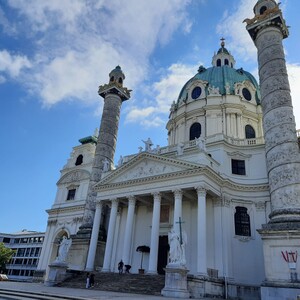 There have been several excellent activities I have been a part of during my research stay, out of which I would like to highlight three of them briefly. I began the project in August 2022, while in the month of September 2022, I had a chance to attend the CHEMIETAGE 2022 in the Technical University of Vienna, which gave me a broad perspective about many fields of chemical research.
There have been several excellent activities I have been a part of during my research stay, out of which I would like to highlight three of them briefly. I began the project in August 2022, while in the month of September 2022, I had a chance to attend the CHEMIETAGE 2022 in the Technical University of Vienna, which gave me a broad perspective about many fields of chemical research.
You might have come across some quotes like this - ‘Learn a new language and get a new soul’ (A popular Czech proverb). I saw this quote oozing out in reality when I started to learn the native language of Austria - German.
In the month October 2022, I started attending the German language A1 course at the Language center of the University of Innsbruck supported by the department funds. I must deliberately point out that, after I was exposed to the German language on a beginner level, I started adoring and admiring the city of Innsbruck, the lovely people, their on-the-dot punctuality, their overall culture, beauty-filled River Inn and the ever-satisfying warmth endowed by the encapsulation of the omnipresent Innsbruck-ish mountains.
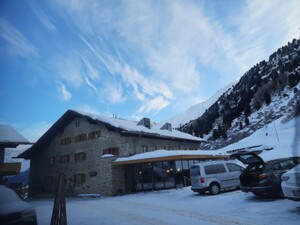 In the month of January 2023, I participated and presented the preliminary research results in the Obergurgl Seminar for Solid state chemistry 2023. On one hand, discussing the spectrum of solid-state chemistry was very exciting, and on the other hand, Obergurgl being a top-notch ski-resort, with breathtaking views of all shades of nature, and it was like a quality time spent with one’s own self in the high mountains and also great memories shared with the fellow researchers and colleagues, and of course with so much of snowy snow.
In the month of January 2023, I participated and presented the preliminary research results in the Obergurgl Seminar for Solid state chemistry 2023. On one hand, discussing the spectrum of solid-state chemistry was very exciting, and on the other hand, Obergurgl being a top-notch ski-resort, with breathtaking views of all shades of nature, and it was like a quality time spent with one’s own self in the high mountains and also great memories shared with the fellow researchers and colleagues, and of course with so much of snowy snow.
Having stayed in Austria for half a year, I can certainly say that it is a welcoming country for international students, and it brought out a confidence in me, to get along well with people from various walks of life, in terms of nationality, culture etc.
On the professional front, I feel that this research stay experience supported by the Aktion Austria-Slovakia scholarship have helped me to mature wisely in scientific knowledge and also guided me on how to visualize the PhD research in right scales, and how a quality research can be brought forward, simply by observing the nuances of the fundamental chemistry with the sensible perspective. This kind of improvement is possible as we get opportunities to get along and discuss science with people who have a better grip in that specific research field.
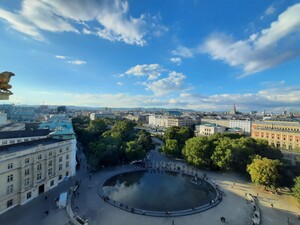 I would vouch for myself that viewing things from a different scientific perspective and establishing a nice scientific collaboration and cooperation between my home university and the host university is the major part of the takeaway back home. In the future, I have plans for coming back to Austria for work, if that becomes plausible.
I would vouch for myself that viewing things from a different scientific perspective and establishing a nice scientific collaboration and cooperation between my home university and the host university is the major part of the takeaway back home. In the future, I have plans for coming back to Austria for work, if that becomes plausible.
Having spoken long-enough about the journey, it will be a huge miss to not endow my special thanks to the OeAD organization (Austrian agency for Education and Internationalization). Everything was well-organized and all information was conveyed following a simple, step-by-step, and systematic approach, which gave no room for confusion or doubts, reaching out equally well for all the applicants.
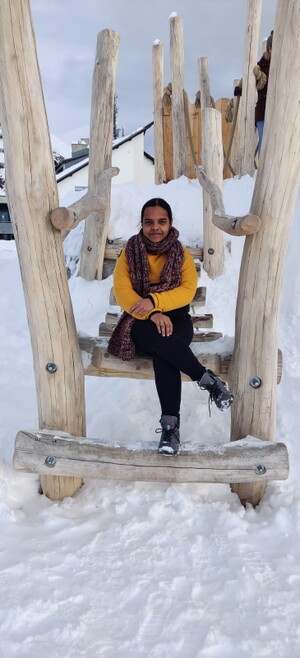 This scientific journey was made so smooth, just because of the special arrangements made by OeAD for the scholarship holders, such as accommodation (credits to: OeAD student housing), insurance etc. besides the funding. In my personal experience, I was always feeling safe in a new country because the contact person Mag. Harald Stauber from the OeAD Innsbruck regional office was always available on emails, to help with any trivial or significant matters.
This scientific journey was made so smooth, just because of the special arrangements made by OeAD for the scholarship holders, such as accommodation (credits to: OeAD student housing), insurance etc. besides the funding. In my personal experience, I was always feeling safe in a new country because the contact person Mag. Harald Stauber from the OeAD Innsbruck regional office was always available on emails, to help with any trivial or significant matters.
The tips for the future ‘Aktion Slovakia-Austria scholarship’ holders is to follow the straight-forward steps from their corresponding OeAD office. Then it is very essential to communicate well your research ideas and thoughts with the host supervisor, and to be curious enough to know more from your fellow researchers. In times of doubt and need for help, don’t always dare to be on your own (to be daring is adventurous, but it might sometimes end up bad - in science and in many instances) and so, always be open to asking for help from others.
This brings me to the closure of this article in the form of acknowledgements and vote of thanks. My special thanks to God, AKTION Austria-Slovakia scholarships, OeAD-GmbH, SAIA n.o., Prof. Dr. Hubert Huppertz, Prof. Dr. Jozef Noga, Assoc. Prof. Lukas Krivosudsky, Assoc. Prof. Gunter Heymann, M.Sc. Leonard C. Pasqualini, Mag. Harald Stauber, Ms.Kristina Sallerova from SAIA, fellow lab mates, family, friends etc.
This article was drafted by Janaki Devi Somasundaram (somasundaram1@uniba.sk), who is currently a third-year PhD student in the Department of Inorganic Chemistry, Faculty of Natural Sciences, Comenius University in Bratislava, Slovakia. Her PhD research is research in the field of bioinorganic chemistry and she was the scholarship holder of the AKTION Austria- Slovakia Scholarships for doctoral students for a period of 6 months from August 2022 to January 2023 in the lab of Prof. Hubert Huppertz, University of Innsbruck, Austria.

